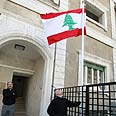
Spies in Lebanon?
Photo: AFP
Report: Hizbullah helped bust Lebanese spies
Lebanese daily says two cells accused of spying for Israel captured so far – one by Lebanon's internal security service, other by Hizbullah. Report says suspects used special equipment given by Israeli intelligence to mark military, civilian targets struck during Second Lebanon War
Two espionage cells operated by Israeli intelligence services in Lebanon have been arrested, Lebanese daily al-Akhbar reported on Friday.
According to the report, the arrests were carried out following strict and precise coordination between Lebanon's internal security service and Hizbullah, with each party responsible for the arrest of one cell.
The capture of the first cell, that was reported on Tuesday, was made by the internal security service. Senior reserve officer Adib A., who headed the cell, was arrested by the service along with his wife. Later on, the main suspect's nephew was also arrested.
Meanwhile, Hizbullah arrested the second cell, that included three people.
The arrest was carried out after a meeting on Wednesday in which the organization's liaison officer for internal security Wafiq Safa presented information on the cell that allegedly kept surveillance over Hizbullah operatives in Lebanon.
Coded radio signals
According to the report, A. was recruited in 1994, while visiting his hometown of Rmeish near Bint Jbeil, that at the time was part of Israel's security zone and controlled by the IDF.During his visit, A. was approached by a resident of the village who he claimed was working for Israel and proposed A. join him for a hefty payment. A. agreed and was transferred to Israel to meet with his handler and undergo an espionage training course.
According to the report, A. confessed to undergoing three additional courses since the initial recruitment and being armed with three advanced communication devices, a camera and objects that have secret compartments.
One of the devices he was given appeared to be a regular radio, but in reality gave a signal whenever messages were transmitted from the Israeli handlers. After receiving the signal, A. would connect the device to a hidden compartment in a mini-bar given to him, and would receive a coded message.
It was also reported that the internal security service intelligence investigators uncovered four messages that were concealed in the mini-bar.
One of the messages, that was sent by A. at the start of the year, said he felt he was in danger of being exposed, and that he had destroyed some of his equipment and documents. In their response, A.'s handlers allegedly tried to calm him down and told him he was not in danger of exposure.
The report said A. also confessed to regularly traveling to Europe – especially Italy, Belgium, Cyprus and Greece, to meet with his Israeli handlers and received large sums of money in the amount of thousands of dollars from them.
Operating in Syria as well
Missions assigned to the spies included marking military and civilian targets in Lebanon using a GPS mechanism, the report said. Some of the targets that were marked were allegedly hit during the Second Lebanon War.It was also reported that the investigators were surprised to learn that in 2004, A.'s missions were broadened to include undercover trips to Syria where he did similar work.
A. maintained during his investigation that he did not give any information to the Israelis pertaining to his prior position in the Lebanese general security service from which he retired in 1998.
The newspaper said the most stubborn of the detainees was A.'s nephew, Joseph A. who, according to the report was recruited separately by Israel's intelligence services, and the connection between him and his uncle was only made by the handlers later on.
A senior source in the Lebanese internal security service said the intelligence branch was on the verge of capturing another cell working for the Israeli intelligence.















